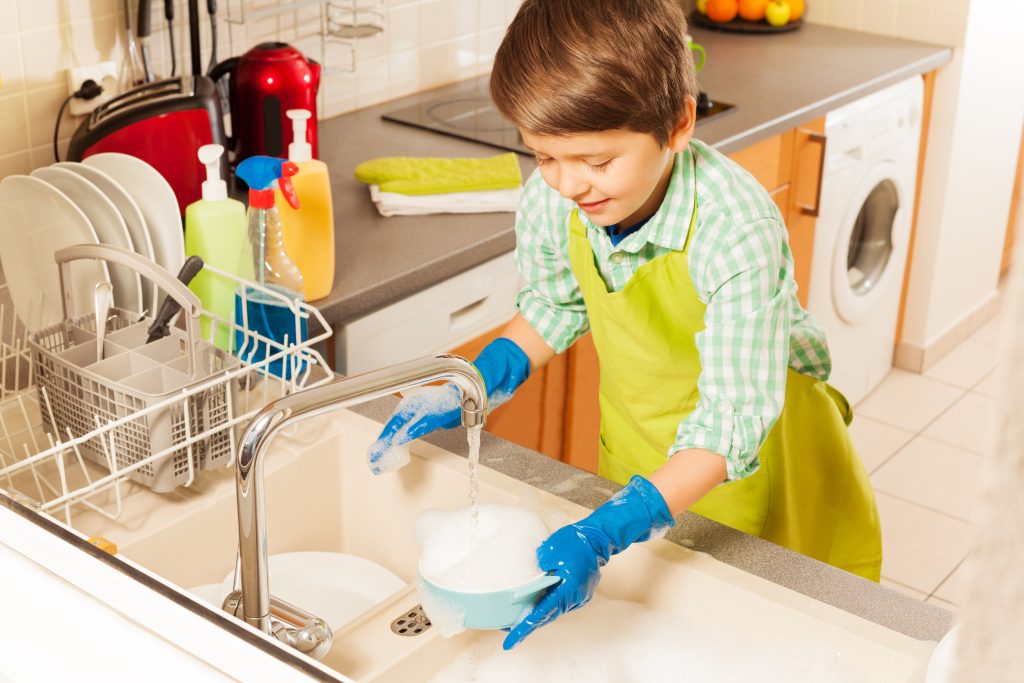
Raising responsible kids doesn’t just happen—it takes intention, patience, and a willingness to hand over the broom. Giving children age-appropriate tasks helps build confidence, independence, and a strong work ethic that will serve them well in every stage of life. But knowing which chores your child should master by the age of 12 can make all the difference between creating helpful habits and causing daily frustration. These aren’t about perfection—they’re about participation and life skills. So if you want to raise a capable preteen, here are the essential household tasks they should have down by the time they hit a dozen candles on their birthday cake.
1. Doing Their Own Laundry
Doing laundry is one of the most practical chores your child should master by the age of 12. Kids this age can learn how to separate lights from darks, measure detergent, and operate the washing machine and dryer safely. It also helps them take responsibility for their clothes, especially when they realize what happens to a red sock in a load of whites. Folding and putting away their clean laundry completes the process and teaches ownership of their belongings. This chore builds independence and reduces your load—literally and figuratively.
2. Washing Dishes or Loading the Dishwasher
By 12, kids should be fully capable of clearing the table, rinsing dishes, and either washing by hand or loading a dishwasher correctly. It’s one of those chores your child should master by the age of 12 because it’s simple, repetitive, and reinforces the idea of teamwork after meals. Teach them how to handle fragile items carefully and the importance of rinsing food off to avoid caked-on messes. If your child complains, remind them that their contribution is essential to keeping the household running smoothly. It’s also a great chance to teach time-saving hacks and basic kitchen hygiene.
3. Vacuuming and Sweeping
These chores may seem basic, but they require focus and follow-through—qualities every 12-year-old should develop. Sweeping and vacuuming help kids recognize messes and understand the importance of cleanliness. Whether it’s cleaning crumbs from the kitchen or pet hair from the living room, this task teaches attention to detail. Plus, using household tools safely and effectively is a skill they’ll carry into adulthood. Make it more manageable by assigning specific zones or days to maintain consistency.
4. Preparing a Simple Meal
Cooking is not just a survival skill—it’s an empowering one, which makes it one of the top chores your child should master by the age of 12. Start with simple dishes like grilled cheese, scrambled eggs, pasta, or smoothies, and build from there. Learning how to prep ingredients, follow instructions, and safely use kitchen appliances gives kids a real sense of accomplishment. It also encourages healthier eating habits and appreciation for the time that goes into meals. With supervision, they can even prepare lunch for the family once a week.
5. Cleaning the Bathroom
No one loves scrubbing a toilet, but that’s exactly why it’s one of the chores your child should master by the age of 12. From wiping down sinks to cleaning mirrors and taking out trash, bathroom upkeep teaches responsibility and respect for shared spaces. Show them how to use safe cleaning products and protect themselves with gloves if needed. While it may not be fun, it’s part of learning that life includes tasks we don’t always enjoy but still need to do. The earlier kids learn this, the easier adulthood becomes.
6. Taking Out the Trash and Recycling
By 12, kids should know how to gather household trash, separate recycling, and wheel the bins to the curb if needed. It’s a straightforward task, but it’s one of those chores your child should master by the age of 12 because it connects them to the rhythms of the household. It also introduces them to environmental awareness—understanding what can be reused or recycled instead of tossed away. Make sure they know the schedule, the proper bins, and how to replace liners. It’s a task with built-in routine and responsibility.
7. Making Their Bed and Tidying Their Room
Personal responsibility starts in their own space, and that’s why making the bed and keeping a tidy room are foundational chores your child should master by the age of 12. A clean room helps kids stay organized and reduces stress. Daily habits like putting away clothes, organizing toys or books, and dusting shelves instill discipline. You’re not asking for showroom quality—just consistent effort and pride in their personal space. Once they master this, it’s easier to extend that effort to shared spaces in the home.
8. Caring for Pets
If your family has pets, daily feeding, fresh water, cleaning cages, or walking the dog should become part of your child’s routine. Caring for animals is one of the most meaningful chores your child should master by the age of 12 because it builds empathy, consistency, and patience. Explain how pets rely on humans and why their well-being matters. When kids take on this task, they learn that being responsible means showing up every day—no matter what. It’s also a great way to connect emotionally and physically with another living being.
Raising Helpers, Not Houseguests
These chores your child should master by the age of 12 aren’t about making kids “pull their weight” like mini adults—they’re about teaching responsibility, respect, and resilience. By gradually introducing these tasks and praising effort over perfection, you’ll raise someone who feels confident and capable. The bonus? You’ll also reduce your own stress while creating a stronger, more cooperative family dynamic.
What chores have been the most helpful for your kids to learn? Share your experiences and advice in the comments—we’d love to hear from you!
Read More:
7 Reasons Parents Must Enforce Chores
If You’re Not Teaching Them This by Age 10, You’re Already Behind
Catherine is a tech-savvy writer who has focused on the personal finance space for more than eight years. She has a Bachelor’s in Information Technology and enjoys showcasing how tech can simplify everyday personal finance tasks like budgeting, spending tracking, and planning for the future. Additionally, she’s explored the ins and outs of the world of side hustles and loves to share what she’s learned along the way. When she’s not working, you can find her relaxing at home in the Pacific Northwest with her two cats or enjoying a cup of coffee at her neighborhood cafe.














